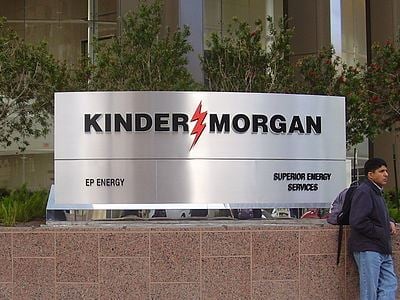Energy
Kinder Morgan Buys Pipeline System, Makes Investors Unhappy
Published:
Last Updated:
Kinder Morgan Inc. (NYSE: KMI) reported fourth-quarter and full-year 2014 results after markets closed on Wednesday. The oil and gas pipeline giant reported earnings per share (EPS) of $0.03 on revenues of $3.95 billion for the quarter. In the same period a year ago, the company reported revenues of $3.87 billion and EPS of $0.33. The consensus estimates from Thomson Reuters called for EPS of $0.34 on revenues of $4.3 billion. Source: Wikimedia Commons
Source: Wikimedia Commons
In a separate announcement, KMI said it is acquiring midstream operator Hiland Partners for $3 billion from Harold Hamm and certain Hamm family trusts. Hamm is founder and CEO of Continental Resources Inc. (NYSE: CLR), and Hiland Partners operates gathering systems and pipelines in the Bakken play in North Dakota. The acquisition is expected to be slightly accretive to KMI’s cash available to pay dividends in 2015 and 2016 and to add approximately six to seven cents beginning in 2017.
For the year, Kinder Morgan reported revenues of $16.23 billion and EPS of $0.89, compared with revenues of $14.07 and EPS of $1.15 in 2013. Consensus estimates called for EPS of $1.19 on revenues of $16.48 billion.
The company also raised its quarterly cash dividend to $0.45 from a prior level of $0.44 in the third quarter. KMI paid out $1.74 per share over the 2014 fiscal year. The company’s cash dividend in the fourth quarter of 2013 was $0.41.
ALSO READ: J.P. Morgan Stays Very Defensive on Top MLPs to Buy in 2015
CEO and Chairman Richard Kinder said:
While we experienced some headwinds in the fourth quarter due primarily to commodity pricing, Kinder Morgan demonstrated once again that our large diversified portfolio of mostly fee-based assets can produce good results even in tumultuous market conditions. … Since the third quarter earnings release, we have placed $730 million of completed projects into service, removed $785 million in projects (primarily in the CO2 segment that have been delayed beyond the time horizon of the backlog due to lower commodity prices), and added $1.24 billion in new projects to the backlog.
In its outlook statement, KMI reiterated its plan announced in early December to increase cash dividends to $2 a share. The company also downplayed the impact on its business of the drop in crude oil prices. KMI produced an average of 57,600 barrels a day of gross oil production and noted that net prices fell by $3.70 per barrel year-over-year on average compared with 2013.
As we noted in our preview of KMI earnings, the company built its 2015 budget on the assumption that crude would fetch $70 a barrel. Every $1 price movement in the price of a barrel of oil and every $0.10 per thousand cubic feet of natural gas will produce a $3 million impact on the company’s earnings.
ALSO READ: Are Oil and Energy Stocks Becoming Too Cheap?
KMI also reiterated its expectation that even with the current level of commodity pricing the company expects “significant excess coverage” in 2015 and still plans to increase its dividends by 10% each year from 2016 through 2010.
KMI also announced that Steven Kean will become CEO of the company on June 1. Richard Kinder will remain as executive chairman. Kinder said, “… I’m not going anywhere … I remain very enthusiastic about the future of the company. I have never sold a share of stock and don’t intend to now.”
All in all, it is a little tricky to reach a general conclusion about KMI’s results. On a per-share basis, the company’s earnings were much lower than expected and revenues were also lower than expected. The catch is, no one knew for sure what to expect.
And KMI manages for distributable cash flow, not earnings per share. By that measure the company did fine, as it always has, because its fee-based business is a cash machine and its ability to borrow money is equally conducive to paying shareholder returns. In many respects we can say of the new KMI that it is the same as it ever was.
In after-hours trading, the shares were down about 2.4% at $41.00 after closing at $42.00. The stock’s 52-week range is $30.81 to $43.18. The consensus price target from Thomson Reuters was around $47 before the report.
ALSO READ: Some MLP Funds Keep Holding Kinder Morgan — Big Time
A financial advisor can help you understand the advantages and disadvantages of investment properties. Finding a qualified financial advisor doesn’t have to be hard. SmartAsset’s free tool matches you with up to three financial advisors who serve your area, and you can interview your advisor matches at no cost to decide which one is right for you. If you’re ready to find an advisor who can help you achieve your financial goals, get started now.
Investing in real estate can diversify your portfolio. But expanding your horizons may add additional costs. If you’re an investor looking to minimize expenses, consider checking out online brokerages. They often offer low investment fees, helping you maximize your profit.
Thank you for reading! Have some feedback for us?
Contact the 24/7 Wall St. editorial team.